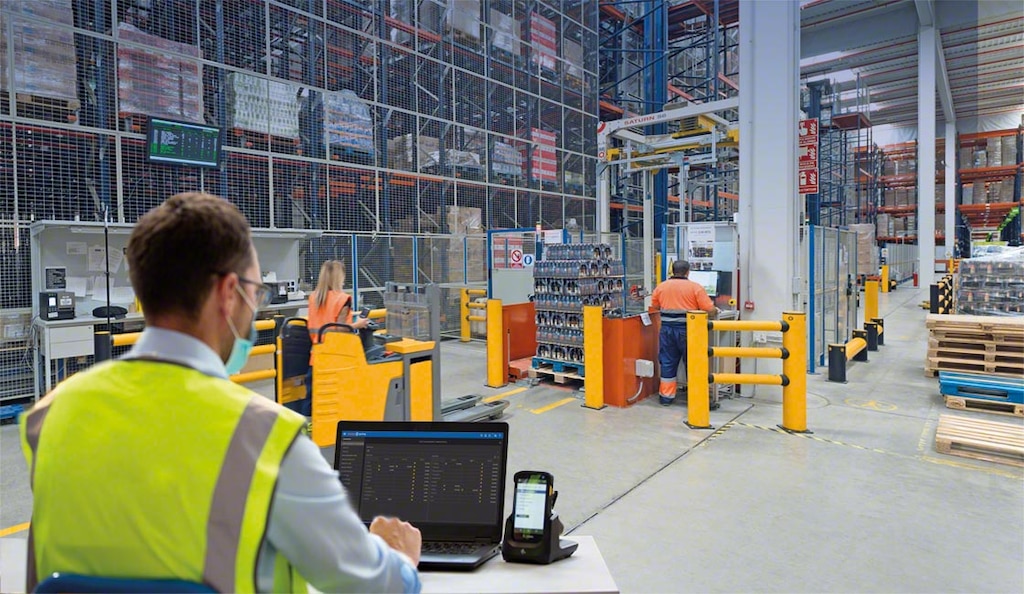
Logistics manager: profile and responsibilities
Logistics manager is a profile on the rise these days. It’s a highly valued position in all types of companies. Against a backdrop in which logistics has become a key element for business competitiveness, logistics managers play a particularly important role: they can optimize all the processes that make up the supply chain.
One basic duty of a logistics manager is to plan operations so that goods are delivered to customers at the agreed-upon times. The first step to dispatching orders on time involves carrying out accurate stock control. This task is fundamental for organizing procurement and having the required products in the warehouse at the right time.
What is a logistics manager?
The logistics manager has become a strategic professional for businesses. This person is charged with supervising supply chain operations, from goods handling and storage to deliveries of orders to points of sale and end customers. Two of the logistics manager’s main responsibilities are to plan the logistics strategy followed by the company and to ensure that customer needs are met.
Business’s logistics processes are becoming more and more complex. The consolidation of multiple sales channels, changing consumer habits, same-day delivery and product returns management have further complicated logistics processes. In the face of all these changes, companies need a logistics manager that can ensure efficient service for customers.
Logistics manager is a multidisciplinary profile. This professional organizes and plans supply chain processes in addition to working with other departments to achieve objectives (e.g., that carriers distribute orders on time and under the terms agreed-upon with customers).
The logistics manager is in contact with all supply chain links. For example, in facilities that feed their production lines with just-in-time materials, this person must guarantee good communication between suppliers, the warehouse, and the production lines. The goal is to ensure the flow of goods in the right quantity and at the right time.

What does a logistics manager do?
The basic job of a logistics manager is to make sure that supply chain processes run efficiently. Let’s take a look at a logistics manager’s responsibilities:
- Plan the logistics strategy. One of the basic duties of a logistics manager is to set short-, medium-, and long-term objectives to manage the supply chain effectively. Some of the most common objectives are to organize product procurement timelines to meet order picking needs, gauge the quantities of goods needed to provide service, and obtain raw materials at the best price.
- Analyze supply chain processes. The logistics manager oversees the performance of the different supply chain operations, i.e., goods unloading, warehouse and stock management, and order dispatch.
- Select suppliers. Working closely with the purchasing department, the logistics manager plays a part in choosing suppliers and products and negotiating service prices. Opting for the supplier that best satisfies the company’s needs will guarantee that delivery deadlines are met.
- Optimize distribution. The logistics manager has to ensure the correct distribution and delivery of the goods, a crucial supply chain process. This professional’s duties include organizing the distribution process and choosing the carriers that will deliver the orders to customers.
In short, the logistics manager is firmly committed to satisfying customer demands. To accomplish this, their day-to-day consists of supervising and optimizing all supply chain processes and making sure the goods are distributed effectively.

Profile and skills of a logistics manager
For the logistics manager to efficiently drive the supply chain, they have to have the necessary skills to respond proactively to market changes.
The logistics manager keeps up to date with what’s happening in the industry. Through innovative technology solutions in logistics processes, this professional can learn to meet new market demands.
One of the core competencies of a logistics manager is analytical skills. They have to be able to interpret data on everything occurring in the supply chain, make comparisons, and assess different scenarios. Logistics managers often employ digital tools such as a warehouse management system (WMS) to analyze supply chain KPIs. This helps to measure operational performance and implement continuous improvement actions.
Since the logistics manager works with many people, they also require leadership capacity to cultivate their team’s talent. This professional is in contact with all supply chain stakeholders, from warehouse operators to suppliers and customers. The logistics manager needs to know how to listen to the needs of everyone involved in the supply chain, assign responsibilities, and have excellent interpersonal skills.
Software for the logistics manager
In an ever-changing market, logistics managers must use a WMS to oversee the supply chain on a daily basis.
With a system like Easy WMS warehouse management software from Interlake Mecalux, companies can control the performance of the different operations in their facilities in real time. The software identifies all products and monitors their movements until they are dispatched.
Digital warehousing brings numerous benefits, including improved processes. The logistics manager can track everything occurring in the warehouse and detect errors, inefficiencies, and improvement opportunities. This way, they can optimize operations like order picking, incorporating assistance systems such as pick-to-light, put-to-light, or voice picking.
To facilitate decision-making, the logistics manager can use a program designed specifically to control the status of the facility. Easy WMS software from Interlake Mecalux, for instance, features a module that provides data on the performance of the multiple jobs in the warehouse. Supply Chain Analytics Software monitors all activity in the facility comprehensively. It converts the information generated into KPIs that help the logistics manager make continuous improvement decisions based on data analysis.

Logistics manager: a professional with a bright future
The supply chain is transforming constantly. Therefore, a logistics manager’s job can be very demanding and, at the same time, exciting. This professional’s ultimate goal is to satisfy customers by ensuring effective service.
Through technology, the logistics manager is equipped with all the information they need to make strategic decisions and maintain a smooth supply chain. At Interlake Mecalux, we’ve developed a WMS that optimizes logistics operations and provides information that enables you to analyze the best way to meet your targets. Get in touch to find out exactly how Easy WMS can scale up your business.
